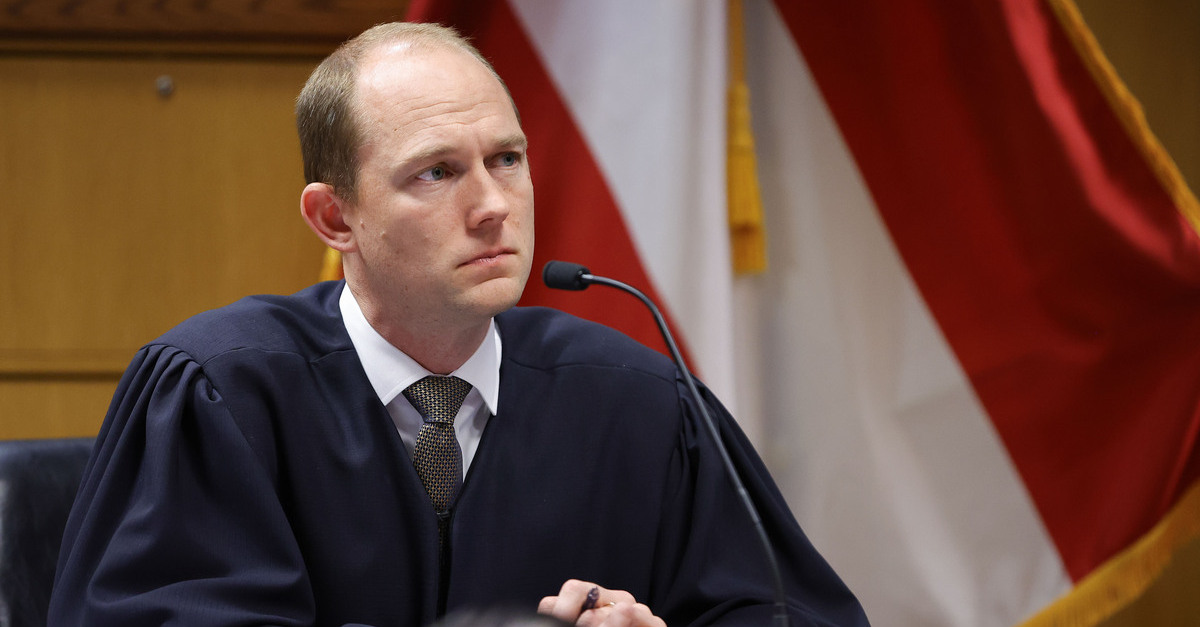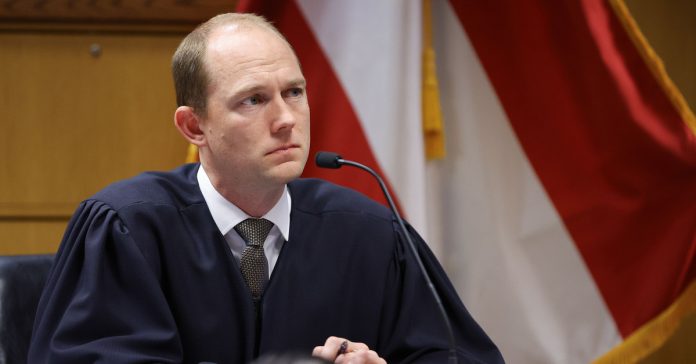
Fulton County Superior Judge Scott McAfee presides in court, Friday, March, 1, 2024, in Atlanta. The hearing is to determine whether Fulton County District Attorney Fani Willis should be removed from the case because of a relationship with Nathan Wade, special prosecutor she hired in the election interference case against former President Donald Trump. (AP Photo/Alex Slitz, Pool)
Fulton County District Attorney Fani Willis faces disqualification in the racketeering (RICO) and election interference case she brought against Donald Trump over her admitted romantic relationship with the attorney she chose to lead the high-profile prosecution.
Closing arguments began with aplomb from the defense on Friday.
“She’s supposed to be disinterested through the Sixth Amendment,” defense attorney John Merchant III said of Willis. “She’s anything but that.”
Merchant and his wife, attorney Ashleigh Merchant, represent co-defendant Michael Roman, a former Trump 2020 staffer accused of a role in the fake electors plot. On Friday afternoon, Roman’s defense attorney described the court as the “guardrails” for defending defendants’ rights and the basic integrity of the legal system.
Willis has been disqualified from a case before, Merchant noted. And, referencing that earlier case, Merchant told the court that even an appearance of a conflict of interest is sufficient for disqualification. Such an appearance is the standard for disqualification in Georgia. But, he added, the broader issue is Sixth Amendment protections.
“If this court allows this kind of behavior to go on,” Merchant argued, “the entire public confidence in the system will be shot.”
In January, Roman’s counsel publicized the district attorney’s romantic relationship with special prosecutor Nathan Wade. The goal of that still-to-be-decided motion, by now well-known, is to have Willis, along with her entire office and her top lieutenants, thrown off the case.
On Feb. 12, the judge overseeing the case gave the defense a decided victory by finding the allegations of nepotism and self-dealing against Willis and Wade were serious enough to warrant sworn testimony in a special hearing. That hearing has now taken up over half a month.
“Willis has developed a very personal interest in this case,” Merchant argued — warning the court that the defense will appeal on that basis if the district attorney and her office are not disqualified.
In response to a question from Fulton County Superior Court Judge Scott McAfee, the defense attorney conceded there is not a definition of “personal interest” in Georgia law, but stressed that Willis had a “very personal financial interest” in the prosecution due to “the scheme that she set up” to financially benefit from Wade’s wages.
“You know it when you see it,” Merchant said — likening the concept of a “personal interest” to the definition of obscenity popularized by then-U. S. Supreme Court justice Potter Stewart in 1964.
Merchant said the mere fact of Wade being hired was improper because “they were dating for two years” when he was brought onto the biggest criminal case in Peach State history in November 2021.
Then, Roman’s defense attorney added, Willis added to that foundational impropriety because she went on overseas trips together that Wade paid for. And, Merchant went on — despite Willis and Wade both testifying she more or less paid her then-boyfriend back for those trips — “exactly $9,247” has been unaccounted for.
In court documents, the district attorney’s office and Wade asserted the two prosecutors essentially went half-and-half on those trips. There is admittedly only a very scant paper trail for those claimed reimbursements. During her time on the stand, Willis explained this discrepancy by saying she often paid Wade back in cash.
“There’s no paper trail here for the cash,” Merchant said at one point.
Moreover, the defense attorney said in response to another question from McAfee, the timeline of the relationship bears directly on the allegations of nepotism and financial self-dealing.
“She put her boyfriend in the spot, paid him, and then reaped the benefits from it,” Merchant argued. “They did this, they knew it was wrong, they hid it, and even when they were called out on it, they tried to create an excuse for it by saying it happened after the fact.”
This is a developing story.
Have a tip we should know? [email protected]

